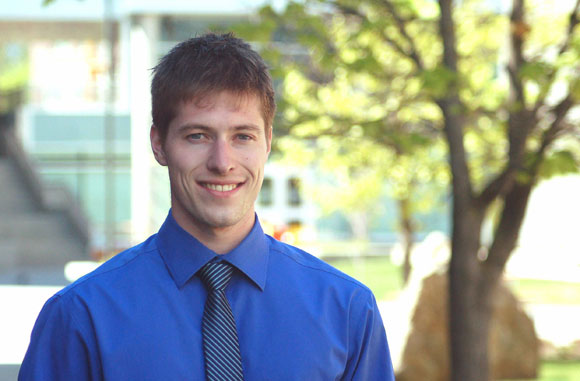
Human Kinetics student Paul Sharp, BC Parks and Recreation Association scholarship recipient.
UBC student Paul Sharp is the 2011 recipient of the BC Recreation and Parks Association (BCRPA) scholarship. A graduate of Okanagan Mission Secondary in Kelowna, Sharp will receive his Bachelor of Human Kinetics (BHK) degree during convocation at UBC’s Okanagan campus on June 10, and he’ll be returning to pursue a master’s degree in September.
Presented to Sharp at a ceremony in Richmond, BC, last week, the BCPRA award was created to ensure future quality leadership through the provision of financial support to emerging leaders enrolled in recreation and parks related studies. It includes $500 along with a variety of special benefits such as membership in the BCRPA, and support to attend next year’s conference.
Sharp was nominated for the scholarship by Human Kinetics professor Sally Stewart, who will be his faculty supervisor for his master’s degree studies. She notes that Sharp has maintained high marks and is among the top students in the Human Kinetics program while also being very involved on and off the UBC campus.
“What adds to the impact of his good marks is that while taking a full course load, participating as a varsity-level athlete, working for Kelowna City Parks and Recreation, serving as a personal trainer for UBC Campus Recreation and a HMKN 100 fitness lab instructor, volunteering, and doing a community placement practicum course, he has still been able to excel in all of these areas,” says Stewart.
Along the way to his human kinetics degree, Sharp has acquired BCRPA Fitness, first-aid, and Canadian Society for Exercise Physiology Certified Professional Trainer (CPT) certifications.
“Paul has used his Human Kinetics course work, augmented by his certifications and work experience, to produce quality research papers and presentations, and to develop an entire exercise program for inactive individuals,” says Stewart.
Sharp’s plan is to continue the program of research he started in his undergraduate degree, in the area of physical activity for children, obesity prevention, and fitness for a sedentary Canadian population.
“I’ll be developing a program for sedentary individuals who have very little activity to start with, and may have decreased functional capacity so they can’t do many activities of daily living,” he says. “We want to progress people to a state where they can do a physical activity program by themselves and be able to adapt their program — so they are self-sufficient in their physical activity.”
“Paul has shown incredible initiative and taken on a real interest and passion for the role of physical activity in our nation,” says Stewart. “His work is extremely innovative as it will have applications from the basic program to fit-specific health issues and populations.”
— 30 —